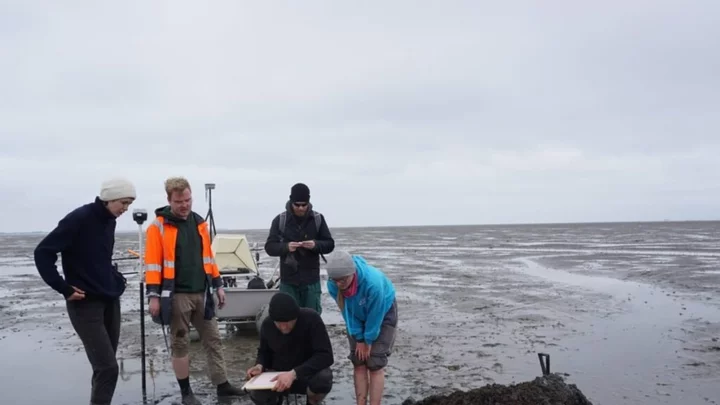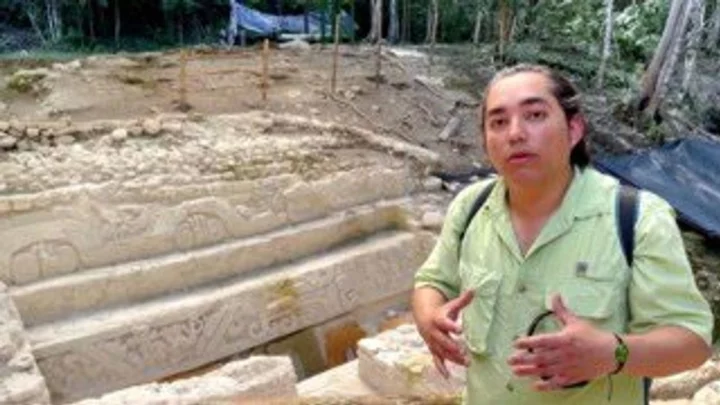
Musk expected to visit China this week, meet officials - sources
HONG KONG/SHANGHAI Tesla Chief Executive Elon Musk is expected to visit China this week, three people with knowledge
2023-05-29 20:24

Europe's 'City of Atlantis' discovered after being lost for 600 years
The remains of a church from a sunken town known as the 'Atlantis of the North Sea' has been discovered beneath the mud on Germany's coast. The church is believed to be part of a site called 'Rungholt' located in the Wadden Sea. The town, which was previously thought to be a local legend, has not been seen since 1362 after it was submerged beneath the waves during an intense storm. However, new research has shown that the town really did exist and that they had built reinforcements around the settlement to protect them from the severe elements. The research was carried out on the area by archeologists from Kiel University, Johannes Gutenberg University Mainz, the Center for Baltic and Scandinavian Archaeology, and the State Archaeology Department Schleswig-Holstein. Sign up to our free Indy100 weekly newsletter Searching the Wadden Sea which is the longest stretch of intertidal sand and mud flats on Earth, the team, using geophysical imaging technology found man-made mounds that had been constructed to protect the town against the tides. Amongst this structure were the foundations of a building which the team determined had to be a church which may have been the location of the town centre. In a statement, Dr. Dennis Wilken, a geophysicist at Kiel University of Kiel University said: "Settlement remains hidden under the mudflats are first localized and mapped over a wide area using various geophysical methods such as magnetic gradiometry, electromagnetic induction, and seismics." Dr. Hanna Hadler from the Institute of Geography at Mainz University added: "Based on this prospection, we selectively take sediment cores that not only allow us to make statements about spatial and temporal relationships of settlement structures, but also about landscape development." Dr. Ruth Blankenfeldt, an archaeologist at ZBSA also suggested that the "special feature of the find lies in the significance of the church as the centre of a settlement structure, which in its size must be interpreted as a parish with superordinate function." The storm that washed away Rungholt has gone down in history as one of the largest to ever hit the region, affecting not just Germany but also the Netherlands, Denmark and the UK. The storm happened on January 1362 and has since been referred to as "the great drowning of men." According to historical reports, Rungholt was once a busy trading port for fishermen but was also populated by taverns, brothels and churches. Have your say in our news democracy. Click the upvote icon at the top of the page to help raise this article through the indy100 rankings.
2023-05-28 19:27

Scientists might have discovered a simple way to stop the ageing process
The feeling of hunger could be a simple way to stop the ageing process, according to a new study. Researchers at the University of Michigan tricked fruit flies into feeling hungry which resulted in the insects living longer – even when they eat their calorie intake. The study - published in Science - suggests that the perception of insatiable hunger alone can generate the anti-aging effects of intermittent fasting. (And since it’s the perception rather than actual hunger, it means the bugs don’t actually have to starve). Sign up to our free Indy100 weekly newsletter "We've sort of divorced [the life extending effects of diet restriction] from all of the nutritional manipulations of the diet that researchers had worked on for many years to say they're not required," physiologist Scott Pletcher said, as per Michigan Medicine. "The perception of not enough food is sufficient." You may have heard the term intermittent fasting before, as it is a popular diet fad that consists of going for extended periods of time without eating, followed by a period of eating normally, according to Bupa. Despite its popularity, evidence supporting its benefits is limited in terms of research on humans. Perhaps you’re thinking… why fruit flies? Well, the insects actually share 75 percent of the same disease-related genes as us, while also sharing similar qualities to mammals in terms of their metabolisms and brains, according to Science Alert. In the research, branched-chain amino acids (BCAA) essential nutrients that appear to trigger feelings of fullness in flies when consumed, were used. The fruit flies maintained their hunger through getting fed snacks low in BCAA and their hunger was noticed through how much the insects ate from a buffet of food hours after eating the snack. More food was consumed by flies who earlier ate a low-BCAA snack, and they choose protein over carbs, focusing on what their hungry bodies needed. From learning this, the team directly activated the neurons in fruit flies that trigger hunger responses, they found these hunger-stimulated flies also lived longer. "Demonstration of the sufficiency of hunger to extend life span reveals that motivational states alone can be deterministic drivers of ageing," Pletcher and colleagues wrote in the findings. Along with fruit flies, rodents have also been part of the study and both seems to suggest calorie restriction can extend life and is good for our health too. Though of course, more extensive research is required to see whether or not this is also the case with humans. Have your say in our news democracy. Click the upvote icon at the top of the page to help raise this article through the indy100 rankings.
2023-05-28 01:27

Remains of the 'Atlantis of the North Sea' discovered in Germany
The remains of a church from a sunken town known as the 'Atlantis of the North Sea' has been discovered beneath the mud on Germany's coast. The church is believed to be part of a site called 'Rungholt' located in the Wadden Sea. The town, which was previously thought to be a local legend, has not been seen since 1362 after it was submerged beneath the waves during an intense storm. However, new research has shown that the town really did exist and that they had built reinforcements around the settlement to protect them from the severe elements. The research was carried out on the area by archeologists from Kiel University, Johannes Gutenberg University Mainz, the Center for Baltic and Scandinavian Archaeology, and the State Archaeology Department Schleswig-Holstein. Sign up to our free Indy100 weekly newsletter Searching the Wadden Sea which is the longest stretch of intertidal sand and mud flats on Earth, the team, using geophysical imaging technology found man-made mounds that had been constructed to protect the town against the tides. Amongst this structure were the foundations of a building which the team determined had to be a church which may have been the location of the town centre. In a statement, Dr. Dennis Wilken, a geophysicist at Kiel University of Kiel University said: "Settlement remains hidden under the mudflats are first localized and mapped over a wide area using various geophysical methods such as magnetic gradiometry, electromagnetic induction, and seismics." Dr. Hanna Hadler from the Institute of Geography at Mainz University added: "Based on this prospection, we selectively take sediment cores that not only allow us to make statements about spatial and temporal relationships of settlement structures, but also about landscape development." Dr. Ruth Blankenfeldt, an archaeologist at ZBSA also suggested that the "special feature of the find lies in the significance of the church as the centre of a settlement structure, which in its size must be interpreted as a parish with superordinate function." The storm that washed away Rungholt has gone down in history as one of the largest to ever hit the region, affecting not just Germany but also the Netherlands, Denmark and the UK. The storm happened on January 1362 and has since been referred to as "the great drowning of men." According to historical reports, Rungholt was once a busy trading port for fishermen but was also populated by taverns, brothels and churches. Have your say in our news democracy. Click the upvote icon at the top of the page to help raise this article through the indy100 rankings.
2023-05-27 22:54

As Elizabeth Holmes heads to prison for fraud, many puzzle over her motives
As Elizabeth Holmes prepares to report to prison next week, the criminal case that laid bare the blood-testing scam at the heart of her Theranos startup is entering its final phase
2023-05-27 22:17

Twitter Withdraws From EU Disinformation Code, Commissioner Says
Twitter exited the voluntary European Union’s Code of Practice on Disinformation, the bloc’s Internal Market Commissioner Thierry Breton
2023-05-27 15:52

Scientists discover 'impossible' ancient Mayan city in remote jungle
It feels like every day there’s a science story that comes along ready to blow our tiny minds, and today is no exception. A series of ancient interconnected cities have been discovered in the remote El Mirador jungle Guatemala, and it’s changing our entire understanding of the ancient civilisation. More than 400 settlements have been uncovered with some dating back as far as 1,000 BC. They’re linked by roads too, and it’s led them to be described as “the first freeway system in the world”. Sign up to our free Indy100 weekly newsletter Richard Hansen, a research professor at the University of Idaho, is an expert on the project and he’d called the findings a “game-changer”. It was previously thought that the Mayan peoples were nomadic, but these cities have changed the scientific community’s understanding. Speaking to the Washington Post, Hansen said: "We now know that the Preclassic period was one of extraordinary complexity and architectural sophistication, with some of the largest buildings in world history being constructed during this time.” On top of the 110 miles of interconnected roads, the discoveries also showed evidence of organised agriculture and even hydraulic systems. The findings are the result of work which first began in 2015, which saw lidar technology uncovered signs of ancient structures below the surface. Archaeologist Enrique Hernández, from San Carlos University said about the findings: “Now there are more than 900 [settlements]… We [couldn’t] see that before. It was impossible,” he said. Have your say in our news democracy. Click the upvote icon at the top of the page to help raise this article through the indy100 rankings.
2023-05-27 15:48

As Elizabeth Holmes heads to prison for fraud, questions remain about her motives
As Elizabeth Holmes prepares to report to prison next week, the criminal case that laid bare the blood-testing scam at the heart of her Theranos startup is entering its final phase
2023-05-27 13:18

US Navy Hit by Chinese Hacking Campaign, Report Says
An alleged campaign by Chinese state-sponsored hackers on targets in the US and Guam has raised fears that
2023-05-27 05:26

‘Monster stars’ 10,000 times bigger than the Sun detected for first time
Scientists have been peering into the depths of space, looking right back at the early days of the universe, and they’ve found something very interesting indeed. Researchers using the James Webb Space Telescope have come across a discovery that indicates some of the very earliest stars to ever form in the universe were staggering in scale, measuring 10,000 times bigger than the Sun. "Today, thanks to the data collected by the James-Webb Space Telescope, we believe we have found a first clue of the presence of these extraordinary stars," says astrophysicist Corinne Charbonnel of the University of Geneva in Switzerland, in research published in Astronomy & Astrophysics. These features are huge collections of between 100,000 and 1 million stars known as globular clusters, which all feature similar properties. Scientists estimate that they were all formed at the same time. Sign up to our free Indy100 weekly newsletter They’re remnants of the ancient universe and have been described by researchers as "fossils". The cores of these stars are much hotter than those we see in stars today, and scientists suggest it could be down to an excess of hydrogen burning at high temperatures. It’s thought that smaller stars collided with the supermassive stars and relished their energy. However, now most of these global clusters are approaching the very end of their life spans. "Globular clusters are between 10 and 13 billion years old, whereas the maximum lifespan of superstars is two million years," said Mark Gieles, previously at the University of Surrey but now at the University of Barcelona, back in 2018. "They therefore disappeared very early from the clusters that are currently observable. Only indirect traces remain." The researcher states: "If the supermassive star scenario can be firmed up by future studies, this would provide an important step for our understanding of globular clusters and for the formation of supermassive stars in general, with numerous important implications.” Have your say in our news democracy. Click the upvote icon at the top of the page to help raise this article through the indy100 rankings.
2023-05-26 23:26

Hugh Grant's lawsuit alleging illegal snooping by The Sun tabloid cleared for trial
A London court has rejected an attempt by the publisher of The Sun newspaper to throw out a lawsuit by actor Hugh Grant alleging that journalists and investigators it hired illegally snooped on him
2023-05-26 23:15

Court says Hugh Grant's lawsuit alleging illegal snooping by The Sun tabloid can go to trial
A London court has rejected an attempt by the publisher of The Sun newspaper to throw out a lawsuit by actor Hugh Grant alleging that journalists and investigators it hired illegally snooped on him
2023-05-26 19:22
